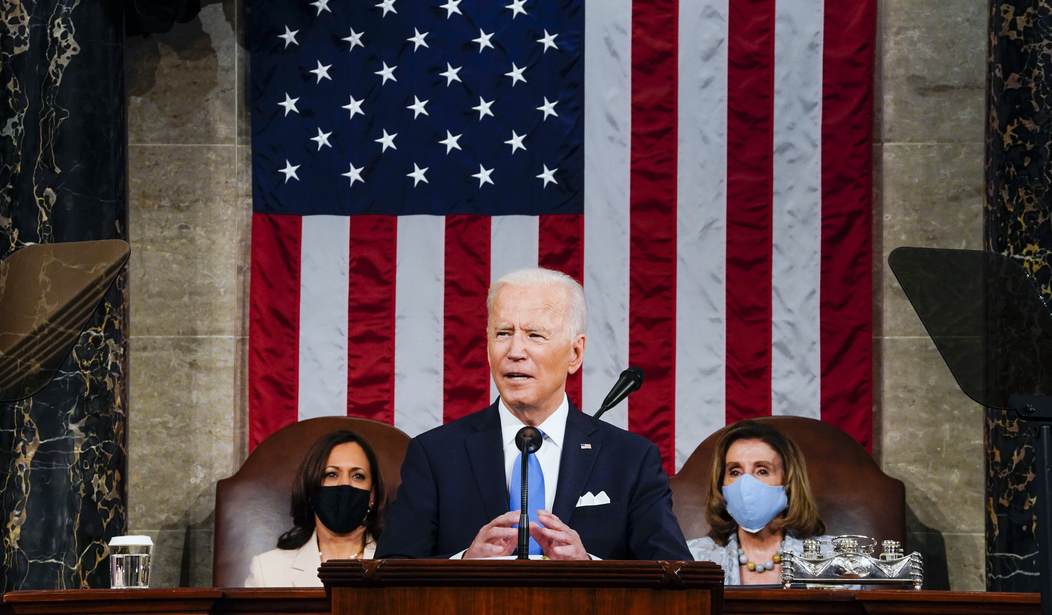“No constitutional amendment is absolute,” Joe Biden lectured Congress last night in pursuit of his gun-control agenda. We’ll get back to that in a moment, but that’s actually only the second dumbest argument Biden made on this point.
There’s a reason why this comes to us from the Bad Legal Takes account:
— Bad Legal Takes (@BadLegalTakes) April 29, 2021
BIDEN: These kinds of reasonable reforms have overwhelming support from the American people, including many gun owners. The country supports reform, and Congress should act. This shouldn’t be a red or blue issue. And no amendment to the Constitution is absolute. You can’t yell fire in a crowded theater. From the very beginning, there were certain guns, weapons that could not be owned by Americans. Certain people could not own those weapons, ever. We’re not changing the Constitution. We’re being reasonable.
Note well that this was no ad-lib, and it’s not the first time Biden’s trotted out this argument. The most recent appearance of this utterly wrong argument was three weeks ago, in almost the exact same form:
“Nothing I’m about to recommend in any way impinges on the Second Amendment,” Biden said. “They’re phony arguments suggesting that these are Second Amendment rights in what we’re talking about.”
Biden added that “no amendment to the Constitution is absolute. You can’t yell ‘fire’ in a crowded movie theater and call it freedom of speech. From the very beginning, you couldn’t own any weapon you wanted to own. From the very beginning of the Second Amendment existed, certain people weren’t allowed to have weapons.”
The “fire in a crowded theater” argument is an old saw derived from a Supreme Court decision that later got repudiated by the Supreme Court. Oliver Wendell Holmes’ argument in Schenck that used this analogy allowed the federal government to throw anti-war protesters in prison during World War I. David Harsanyi explained this at National Review at the time:
This is probably the weakest – and the most infuriatingly overused — analogy used in efforts to restrict rights. The line, taken from Oliver Wendell Holmes’ decision in Schenck v. United States and subsequently repeated by thousands of censorship apologists since, was at the heart of one of the most egregious violations of free expression in American history. The Schenck decision allowed the Wilson administration to throw anti-war activists into prison for violating the Espionage Act of 1917. It’s difficult to think of a more legitimate exercise of political expression than debating war and peace. In any event, Schenck was basically overturned by the Brandenburg v. Ohio decision, which found that the First Amendment protects speech unless it is likely to incite “imminent lawless action,” which yelling “fire in a theater” does not.
By the way, Brandenburg was decided in 1969. You’d think an attorney like Biden, let alone a lawmaker, would have become cognizant of the precedent at some time over the past 52 years. Or at the very least, Biden’s speechwriter would have checked out that reference and its usage.
Why Biden keeps making an ugly violation of free-speech rights as an argument to restrict firearms is anyone’s guess. It’s also unclear why he insists on using the straw-man argument about “absolute” amendments. No one is arguing that all legislation and regulation on firearms ownership is illegitimate. What is being argued is that Biden’s proposals are arbitrary and designed to interfere with legitimate individual rights to keep and bear arms, and that Biden’s time might be better spent enforcing the laws already on the books. How many prosecutions, for instance, did the Obama administration pursue against felons who tried to purchase firearms but got stopped by background checks? That itself is a federal crime, but one rarely investigated, let alone prosecuted.
Besides, a few amendments certainly seem absolute, including the Fifth, Sixth, and especially the Thirteenth Amendments. Unless Biden wants to argue that slavery is negotiable, based on congressional action. And for that matter, if Biden’s arguing that no amendment is absolute, then let’s talk about setting some serious limits on the “right” to have an abortion, which isn’t even enumerated in the text of the Constitution — unlike the right to keep and bear arms.








Join the conversation as a VIP Member